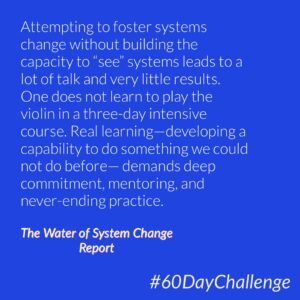 “Systems change is about shifting the conditions that are holding a problem in place.”
“Systems change is about shifting the conditions that are holding a problem in place.”
Maybe I’m just more aware of it now, but systems thinking seems to come up quite a bit as I personally explore this idea of school transformation.
One resource that has crossed my path is The Water of System Change published by FSG, an organization whose mission it is to “reimagine social change.”
OK..down the rabbit hole… 🐰🐰🐰
The document (one of the authors is the reputable systems scientist Peter Senge), presents a framework that is based on the work of another systems scientist, Donella Meadows — the idea we’ve shared previously — changing systems structures is necessary but easier than changing mindsets.
In the report, we are presented with an inverted pyramid graphic with three levels of change:
- Structural Change (explicit) – policies, practices and resource flows
- Relational Change (semi-explicit) – relationships & connections, power dynamics
- Transformative Change (hidden) – mental models
OK…down another rabbit hole…🐰🐰🐰
Embedded on the website is a video from a webinar. Two interesting pieces that I think apply to leadership and educational change.
Tulaine Montgomery, one of the presenters working in the entrepreneur space, shared three kinds of roles people who lead systems change play:
- Orchestrator: facilitates alignment towards common goals and coordinates action across groups, organizations and sectors
- Innovator: creates new, actionable solutions to address dysfunctions in the system
- Agitator: creates visibility into system dysfunction and/or raises grievances of individuals or groups to the forefront of awareness
She then shares “selection criteria” for leaders…now remember, she is in the entrepreneur space. But I think these could easily be “traits” or competencies of effective systems thinking leaders.
- Has or creates proximity to the people and the problem they are addressing.
- Engages with individuals most affected by the problem as assets (possessing talents, skills, and expertise) in developing solutions.
- Views and embodies collective leadership as a critical component in achieving systems change.
- Focuses on shifting multiple interrelated systemic conditions.
- Is systems aware–understands relationships and power dynamics between players in the system.
- Addresses the deeper, transformative levers of systems change (i.e. power dynamics, relationships and narratives) in addition to structural levers (i.e. practices, policies and resource flows)
My sense from the video is that these came from her practice and aren’t necessarily “research based.” They do not appear in the report referenced earlier.
I also did a quick scan of educational leadership standards/competencies, and couldn’t find any explicit mention of systems thinking as a competency. Implied…but not explicit. Hmm….interesting.
—–
❓ Provocations:
What stories can you tell from your experience that support the roles and/or traits/competencies of a leader versed in systems thinking? Considering the current and future context of education/schooling, how critical is it that leaders be skilled systems thinkers?
💎 Resource:
The Water of System Change, report published by FSG
🧠 Mindsets:
Systems thinking
💡 Areas:
Leadership
📣 Drop your thoughts in the comments, or in the Facebook group, and feel free to share resources. 🔥🔥🔥
- A silver lining - January 22, 2022
- Is our use of tech working against us? 🤔 - September 8, 2021
- What’s NOT going to change in the next 10 years? 🤔 - September 7, 2021